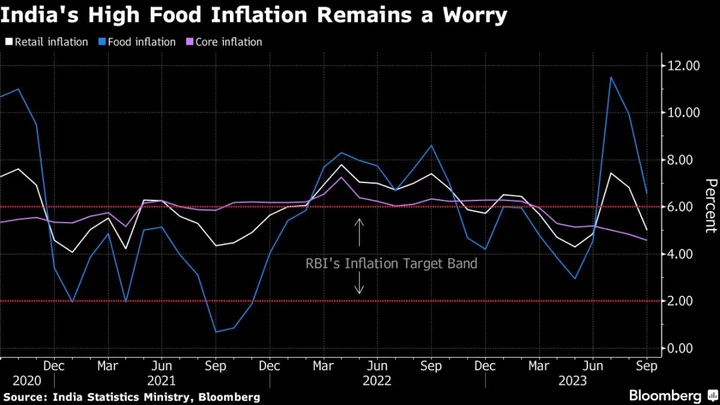Sign up for the India Edition newsletter by Menaka Doshi – an insider's guide to the emerging economic powerhouse, and the billionaires and businesses behind its rise, delivered weekly.
India’s inflation remains vulnerable to “recurring and overlapping” food price shocks, central bank Governor Shaktikanta Das said, indicating policymakers will remain vigilant as onion costs continue to rise.
While inflation is “on a path of moderation,” it remains above the Reserve Bank of India’s 4% target, Das said in a speech hosted by the Tokyo Chamber of Commerce and Industry on Thursday. Monetary policy “remains watchful and actively disinflationary to progressively align inflation to the target,” he said.
The governor’s comments came ahead of data due Monday that’s likely to show inflation slowed further to 4.8% in October, according to a Bloomberg survey of economists.
However, food prices, which make up about half of the inflation basket, remain a risk, threatening the overall picture. The RBI hiked interest rates several times this year to curb inflation, but has left rates unchanged for four policy meetings now.
Average prices of onions, a key ingredient in an Indian meal, jumped more than 60% last month, according to government data. Authorities recently imposed export curbs to boost domestic supplies and curb costs.
Deutsche Bank AG said onion prices will likely continue to trend higher, despite the government measures.
“If food prices rise higher in November than we currently anticipate, then CPI inflation could rise close to 6% once again,” the bank said in a report Thursday. Under that scenario, the bank then expects greater disinflation from December through February, it said.
Controlling food prices is a key priority in a country where political parties can lose elections for failing to curb inflation. Five states, including Rajasthan, Madhya Pradesh and Chhattisgarh, are holding polls in November, followed by a national election in early 2024, when Prime Minister Narendra Modi will seek a third term in the office.
Das said domestic demand remains strong in Asia’s third-largest economy and is helping provide a cushion against external shocks. The RBI expects growth of 6.5% in the fiscal year ending in March.
Das also made the following comments in the speech:
- The balance sheets of banks and corporates are the healthiest they’ve been in a long time, which bodes well for a revival in investment alongside the public investment push by the government
- India’s current account deficit remains “eminently manageable,” while the nation’s foreign exchange reserves are sufficient to deal with risks

